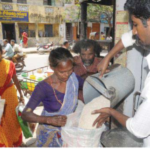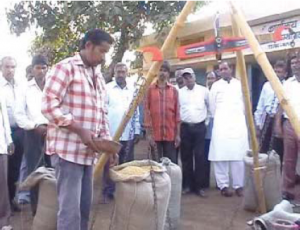www.spancotele.com
In terms of both coverage and public expenditure, the most important food safety net is the Public Distribution System (PDS). PDS provides rationed  amounts of basic food items and other non-food products at below market price to consumers through a network of Fair Price Shops (FPS) spread all over the country. However, the food grains supplied by the ration shops are not enough to meet the consumption needs of the poor or are of inferior quality. The average level of consumption of PDS grains in India is only 1 kg per person / month.
amounts of basic food items and other non-food products at below market price to consumers through a network of Fair Price Shops (FPS) spread all over the country. However, the food grains supplied by the ration shops are not enough to meet the consumption needs of the poor or are of inferior quality. The average level of consumption of PDS grains in India is only 1 kg per person / month.
The PDS has been criticised for its urban bias and its failure to serve effectively the poorer sections of the population. The targeted PDS is costly and gives rise to a lot of corruption in the process of extricating the poor from those who are not poor. Despite the PDS, India accounts for over 400 million poor and hungry people. Numerous malpractices make safe and nutritious food inaccessible and unaffordable to many poor.
Spanco, has emerged as a preferred ‘Government Transformation Service’ provider, its e-Governance Unit has been entrusted with the task of transforming the current supply and distribution chain into a technology driven system. Once complete; the new model will solve issues related to pilferage in transit – godown – ration shops, fake ration cards, manual transaction records, and unreliable data. Apart from revenue savings by state governments, this solution will directly benefit a large number of population living below poverty line (BPL) who cannot afford food grain in open market.
The project covers the entire distribution network of FPSs spread across Talukas and district supply offices that reports to regional offices in State. Apart from the above, it is planned that all the Food and Civil Supplies (FCS) offi ces including HO,
Divisional Offices and Taluka offices will be computerised and networked using MPLS/VPN broadband connectivity. A high-tech Data Center will be deployed which will connect with the rest of the department offi ces across a State.
CURRENT SYSTEM
Each FPS serves a few hundred households and the allotment for food and kerosene is done according to the number of ration cards. The sum of all the requirements of FPS in talukas is the procurement size of the state government from FCI. State government buys these food grains at market price and sells it
through FPS at subsidised price incurring a defi cit on the budget. The entire process is manual with no real time record of the actual distribution, benefi ciaries and actual number of ration cards (excluding fake ration cards) leading to the situation where:
1.Many retail shopkeepers have large number of bogus cards to sell food grains in the open market.
2.Many BPL families not able to acquire ration cards either because they are seasonal migrant workers or because they live in unauthorised colonies and a lot of families also mortgage their ration cards for money.

 Pilferage may occur at different levels in the distribution network. There is currently no automated system to track the total number of active ration cards in each FPS. Middlemen typically try to take advantage of this by procuring on the basis of the registered cards, which may not directly correlate with the actual number of active cards. The entire system needs tracking and efficient real time data to reach the core of the issue and establish new architecture assisted by technology.
Pilferage may occur at different levels in the distribution network. There is currently no automated system to track the total number of active ration cards in each FPS. Middlemen typically try to take advantage of this by procuring on the basis of the registered cards, which may not directly correlate with the actual number of active cards. The entire system needs tracking and efficient real time data to reach the core of the issue and establish new architecture assisted by technology.
FCS aims to tackle the above issue with the assistance of technology and Spanco Ltd., intends to transform the entire distribution process, which will have the following features:

1.Existing ration card will be converted into a bar code based laminated ration card
2.All the ration cards will be digitised
3.Biometric fi nger prints will be used for the identifi cation of card holder 4.Entire rationing process will be automated with real time transaction
records
5.Point of sale (POS terminals with inbuilt Smart Card Reader, Magnetic Stripe Reader, Finger Print Scanner and Bar Code Scanner and printer will be deployed at FPS
6.Deployment of Data Centre and Disaster Recovery
7.Deployment of GPS instruments in trucks carrying food grains for efficient tracking
8.Development of the Software Application on a Service oriented Architecture
BENEFITS OF TECHNOLOGY ASSISTED DISTRIBUTION SYSTEM
Vehicle tracking through GPS instruments will assure delivery of goods from FCI godown to the state godown. Pilferage in transit can be avoided with this solution. At the FPS, every transaction will be recorded in encrypted manner through the POS device, which will enable decision making at the higher levels in government. This will ensure the right allotment of food grains for FPS based on the active ration card users.
Biometric record of the ration cardholder (head of the family) will help in the identifi cation process. Also inter-state migration rate in India is more than 30 percent. A study further reveals deeper malaise in the PDS which indicates that there can be as many as 50 bogus ration cards under each ration shop and the figure may go up to 150-200 per ration shop, in other large cities. Bogus card holders get subsidised commodities leaving nothing for those who really need it. Biometric identification process will immediately identify the duplicateration card as well as non-existing ration cards and block them as bogus, thus eliminating malpractices and reducing the burden on government PDS budget. The New proposed system will track every transaction in the state and deliver the status of every ration card and FPS stock to the higher authority. All this exercise will be done in real time.
The project scope involves building a Data Centre, which would be linked with the various other departments. The data gathered and stored will provide business intelligence for budgeting and other activities. The Data Centre site will be equipped with redundant servers to avoid losses and further strengthened by a Disaster Recovery Site (DRS) which will be built at an alternate location. The new system will identify and plug loopholes and leakages in the present distribution network and create an environment of accountability at each level.
RAJIV AGGARWAL, CEO, SPANCO e-GOVERNANCE
 Rajiv is responsible for managing the strategy and solutions to position Spanco as a market leader in this space. He has more than 30 years of experience in working on Government Projects and has successfully managed the entire IT spectrum from Products, Solutions to Services. During the last four decades, he has been involved in large citizen centric projects covering the Urban and Rural parts of the country. Rajeev was instrumental in launching the fi rst Smart Card based system in the country and overseeing the roll- out of CSCs across the country. He holds a Bachelor’s degree in Engineering, with specialisation in Electronics from BITS-Pilani.
Rajiv is responsible for managing the strategy and solutions to position Spanco as a market leader in this space. He has more than 30 years of experience in working on Government Projects and has successfully managed the entire IT spectrum from Products, Solutions to Services. During the last four decades, he has been involved in large citizen centric projects covering the Urban and Rural parts of the country. Rajeev was instrumental in launching the fi rst Smart Card based system in the country and overseeing the roll- out of CSCs across the country. He holds a Bachelor’s degree in Engineering, with specialisation in Electronics from BITS-Pilani.
Be a part of Elets Collaborative Initiatives. Join Us for Upcoming Events and explore business opportunities. Like us on Facebook , connect with us on LinkedIn and follow us on Twitter, Instagram.











